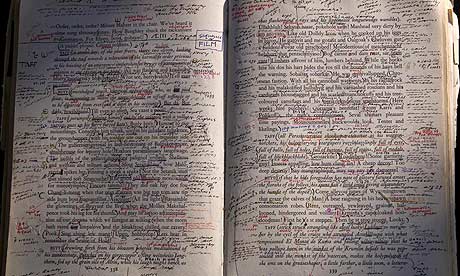
Thirty years' editorial labours produce 'more comprehensible' Finnegans Wake
After 9,000 emendations to James Joyce's notoriously impenetrable novel, a 'smoother' new edition is promised

The editors' copy of Finnegans Wake. Photograph: Nick O'Neil
Thirty years of work and 9,000 amendments later, a new edition of James Joyce's most perplexing novel, Finnegans Wake, is promising to provide readers with a smoother, more comprehensible version of the author's final work.
On its publication on 4 May 1939, a review of the book in the Guardian despaired of making sense of it. Pointing to a sample from the book – "Margaritomancy! Hyacinthous pervinciveness! Flowers. A cloud" – reviewer B Ifor Evans said that "the work is not written in English, or in any other language, as language is commonly known". "In 20 years' time, with sufficient study and with the aid of the commentary that will doubtless arise, one might be ready for an attempt to appraise it," he wrote. "Compared with this, Ulysses is a first-form primer."
Seventy years on, scholars Danis Rose and John O'Hanlon have reached the conclusion of 30 years of textual analysis. Poring over the tens of thousands of pages of notes, drafts, typescripts and proofs that make up, in Joyce's own words, his "litters from aloft, like a waast wizzard all of whirlwords", they have made 9,000 "minor yet crucial" amendments and corrections to the book, from misspellings to misplaced phrases, ruptured syntax and punctuation marks.
"I never thought I'd see this day," said Rose. "The complexity of the texts and the complexity of the social situation meant it was very, very difficult indeed, but we stuck with it and we got there. There were 20,000 pages of manuscript, and beyond that 60 notebooks, and beyond that it extended out into thousands of different volumes. It extends out and out and out – what Joyce was doing was distilling in and in and in. To reach the text we had to follow him back, and it's a lot harder to go backwards than forwards."
Joyce himself, reported to have said that he wrote the book "to keep the critics busy for 300 years", and that "the only demand I make of my reader is that he should devote his whole life to reading my works," would no doubt have been delighted by their lengthy efforts.
Publisher Houyhnhnm Press said that although the changes were minor, they were "nonetheless crucial in that they facilitate a smooth reading of the book's allusive density and essential fabric". Even the opening line of the book is slightly altered. The original reads: "riverrun, past Eve and Adam's, from swerve of shore to bend of bay, brings us by a commodius vicus of recirculation back to Howth Castle and Environs." Rose and O'Hanlon's version fiddles slightly with spelling and punctuation, to open the novel with: "riverrun, past Eve and Adam's, from swerve of shore to bend of bay, brings us by a commodious vicus of recirculation back to Howth Castle & Environs."
Rose said that the new edition means that "Finnegans Wake's time has come". "We are finally becoming Joyce's contemporaries," he said. "It has taken 90 years since Ulysses for us to learn to begin to read Finnegans Wake. Now Ulysses can step aside. It belonged to the 20th century, and Finnegans Wake belongs to the 21st." Houyhnhnm will publish a limited edition of the book, priced at £250 for a standard version and £750 for a special version bound in black calfskin, next week, with a paperback edition due from Penguin at a later date. Rose said the new edition's publication marked the conclusion of his relationship with Joyce. "It's best to leave while you're still grateful," he added.


No comments:
Post a Comment